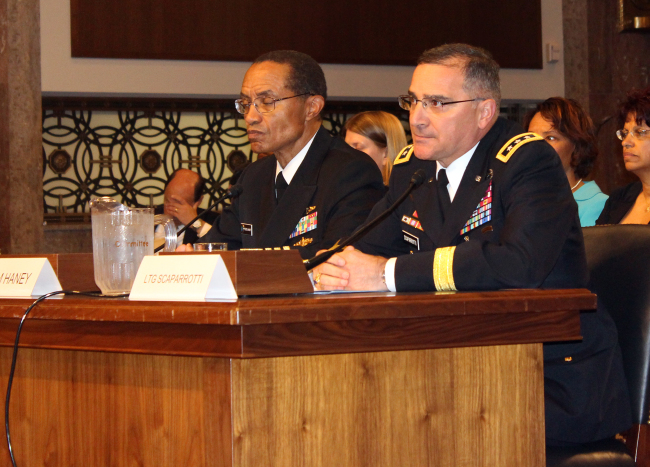 |
커티스 스카파로티 주한미군 사령관 지명자가 30일(현지시간) 미국 상원 군사위원회 인준 청문회에서 전작권 전환 등 주요현안을 묻는 의원들의 질의에 답변하고 있다. (연합뉴스) |
<관련영문기사>
Allies face tough coordination over OPCON transfer
U.S. top brass support December 2015 plan; Seoul hopes for delay
Seoul and Washington face a tough reassessment of the timing of the transfer of wartime operational control as U.S. military leaders appeared cautious over another delay in the handover slated for December 2015.
The allies began their consultations over the possible delay this week at their high-level defense dialogue in Seoul after the South’s request in May for a review of the timeline in light of North Korea’s increasing nuclear threats.
During the two-day Korea-U.S. Integrated Defense Dialogue that ended Wednesday, Washington officials showed a positive response to the reassessment, Seoul officials said. Yet, top U.S. military officers were in support of the current 2015 plan.
“I do agree with the timetable. It is a bilateral agreement -- Strategic Alliance 2015 -- to turn over operational control by December of 2015,” Army Lt. Gen. Curtis Scaparrotti, a U.S. Forces Korea commander nominee, said during a Senate confirmation hearing Tuesday.
“I think it’s a good plan ... And I think we should move forward with it,” he said, adding that it was expected to pave the way for enhanced combat readiness.
After the parliamentary process, Scaparrotti is to be promoted to a four-star general and replace Gen. James D. Thurman to take the top positions in the USFK, Korea-U.S. Combined Forces Command and U.N. Command.
The remarks by Scaparrotti followed similar comments by U.S. Joint Chiefs of Staff Chairman Gen. Martin Dempsey.
“I support the transfer as scheduled. From a military perspective, the timing of the transfer of wartime OPCON is appropriate,” Dempsey said during a parliamentary session on July 18.
Calling the South Korean military a “very capable force,” he said the allied forces were working hard to have it meet requirements for the transfer including the acquisition of weapon systems; command and control systems; intelligence, surveillance reconnaissance platforms and appropriate and adequate supply of munitions.
Despite the top brass’ support of the 2015 plan, U.S. Pentagon officials were said to have made a positive response to Seoul’s request at the KIDD. The U.S. side was headed by Deputy Assistant Secretary for East Asia David Helvey.
The allies are expected to decide on whether to postpone the transfer during their high-level Security Consultative Meeting to be held in October in Seoul, observers and sources said.
Seoul’s call for more flexibility in the timing of the handover came as Pyongyang has continued to pose greater security threats to its southern neighbor with its persistent pursuit of nuclear arms and longer-range missiles.
The North has conducted three underground atomic tests including the latest in February, and its successful missile launch in December showed that it was close to developing intercontinental ballistic missiles with a range of 10,000 km, far enough to hit the U.S. mainland.
Conservatives here have said that the OPCON transfer could embolden an increasingly provocative Pyongyang.
They also argue it would weaken the U.S. security commitment to the South as Washington seeks to reorganize its forces to make them more flexible, agile and rapid in responding to regional, global security challenges rather than focusing them in a limited zone.
Meanwhile, the Rodong Sinmun, the daily newspaper of the North’s ruling Workers’ Party, criticized Seoul’s call for reassessing the timing of the transfer, saying, “The South seeks to realize its ambitions to invade the North.”
Initially scheduled for April 2012, the transfer was first delayed to the end of 2015 in June 2010 amid Pyongyang’s continuing provocations, including the torpedoing of the South Korean corvette Cheonan that killed 46 sailors.
The allies agreed in 2007 to transfer wartime operational control in April 2012 as the Roh Moo-hyun administration had sought to enhance Korea’s military self-reliance and “balance” the alliance with the U.S.
By Song Sang-ho (sshluck@heraldcorp.com)






![[Today’s K-pop] Blackpink’s Jennie, Lisa invited to Coachella as solo acts](http://res.heraldm.com/phpwas/restmb_idxmake.php?idx=644&simg=/content/image/2024/11/21/20241121050099_0.jpg)
